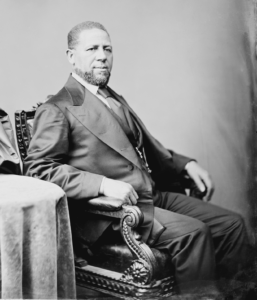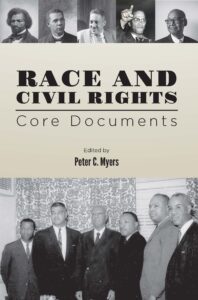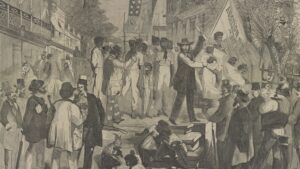
Hiram Rhodes Revels: The First Black Senator
Hiram Rhodes Revels
On February 25, 1870, the first African American ever elected to the office of Senator was sworn in. Hiram Rhodes Revels was elected by the Republican-dominated Mississippi legislature to fill out the unexpired term of Jefferson Davis. Revels had distinguished himself in a variety of leadership roles; he had worked from Maryland to Mississippi as a minister in the African Methodist Episcopal Church; he was a recruiter of black regiments in the Union Army; he served as an army chaplain; and organized schools for freedmen.

Upon Revels’ arrival in the Senate on February 23, 1870, a few Senators tried to block the acceptance of his credentials. They argued that he and other African Americans had gained citizenship only four years prior, with the passage of the 1866 Civil Rights Act. (The US Constitution stipulates in Article I, Section 3, clause 3 that “No person shall be a Senator who shall not have . . . been nine years a Citizen of the United States.”) The argument was specious, as Revels’ supporters pointed out. While residing years earlier in Ohio, Revels had exercised his citizen’s right to vote. After two days, Senator Charles Sumner made a forceful speech that brought the debate to an end.
“What the Black Man Wants”
The strange argument over Revels’ credentials calls to mind a powerful speech made shortly before the end of the Civil War by Frederick Douglass. Speaking to the Massachusetts Anti-Slavery Society on “What the Black Man Wants,” Douglass insisted on the granting of full civil rights for African Americans at the conclusion of the Civil War. Emancipation had been granted as a war measure, so as to add the strength of African American troops to the Union Army. But full citizenship rights, including suffrage, should follow. To not grant these would not only deny the equality of black men to other Americans; it would impugn the honor of a nation that would soon be working out a system to readmit the rebel states to the Union:
Do you mean to give your enemies the right to vote, and take it away from your friends? Is that wise policy? Is that honorable? Could American honor withstand such a blow? I do not believe you will do it. I think you will see to it that we have the right to vote. There is something too mean in looking upon the Negro, when you are in trouble, as a citizen, and when you are free from trouble, as an alien. When this nation was in trouble, in its early struggles, it looked upon the Negro as a citizen. In 1776 he was a citizen. At the time of the formation of the Constitution the Negro had the right to vote in eleven States out of the old thirteen. In your trouble you have made us citizens. In 1812 Gen. Jackson addressed us as citizens—“fellow-citizens.” He wanted us to fight. We were citizens then! And now, when you come to frame a conscription bill, the Negro is a citizen again. He has been a citizen just three times in the history of this government, and it has always been in time of trouble. In time of trouble we are citizens. Shall we be citizens in war, and aliens in peace? Would that be just?

Our Bookstore
You can find Douglass’ speech and many more teachable and relevant civil rights documents in our Core Document Collection volume Race and Civil Rights. Paper copies and free downloads are available in TeachingAmericanHistory.org’s online bookstore.



